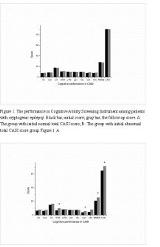COGNITIVE PERFORMANCE IN CRYPTOGENIC EPILEPSY
Abstract number :
1.151
Submission category :
Year :
2005
Submission ID :
5203
Source :
www.aesnet.org
Presentation date :
12/3/2005 12:00:00 AM
Published date :
Dec 2, 2005, 06:00 AM
Authors :
Chin-Wei Huang, Yi-Jung Hsieh, Ming-Chyi Pai, and Jing-Jane Tsai
Cognitive impairment in epilepsy has gained much attention in clinical practice. most of them are focused on the seizure type, age at seizure onset, seizure duration, antiepileptic drugs and epilepsy surgery. Few studies specifically focused on cryptogenic epilepsy. In addition, how the cognitive performance in cryptogenic epilepsy responds to treatment remains elusive. We investigated the cognitive performance in cryptogenic epilepsy patients with the aid of cognitive ability screening instrument (CASI), based on cross-sectional and longitudinal aspects. One hundred patients met the diagnostic criteria of cryptogenic epilepsy were recruited from a national university hospital. The patients with normal total CASI scores were compared with those with abnormal ones. We also compared the follow-up CASI score after 3 years with the previous one in all cryptogenic epilepsy patients. 36% of cryptogenic epilepsy patients showed cognitive impairment. The variables correlated with higher risks of cognitive impairment were lower educational status, number of seizure types, duration of seizure and polytherapy, especially the lower educational status. The correlation between CASI and the MMSE was excellent. As to the follow-up study, the abnormal group showed significant improvement in total CASI score. The normal group showed no significant change. We suggest that in cryptogenic epilepsy, lower educational status remains the most important factor in determining cognitive performance. Adequate treatment with anti-epileptic drugs can improve cognitive performance in previously cognitively impaired patients.[figure1][table1] (Supported by National Cheng Kung University Hospital.)
